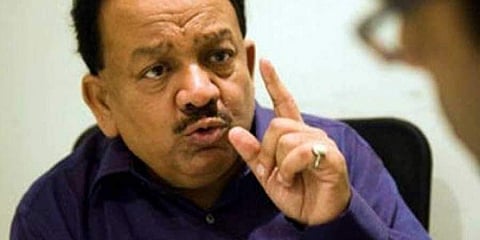

Genuine concerns over the National Medical Commission Bill have been addressed and the legislation will be one of the biggest reforms, Union minister Harsh Vardhan said in Lok Sabha on Monday.
The bill would replace the 63-year-old Medical Council of India (MCI) with the commission to reform the medical education sector. It also seeks to repeal the Indian Medical Council Act 1956, stating that the council that was set up was corrupt.
It has been alleged that the process by which the MCI regulated medical colleges was flawed. Moving the bill for consideration in Lok Sabha, Vardhan said it seeks to put in place a new structure to tackle challenges in the medical education sector.
Asserting that the bill is pro-poor legislation, he said it would bring not only government seats but also 50 per cent of all private seats within the reach of meritorious students belonging to economically weaker sections. The Minister of Health and Family Welfare sought to assure that genuine concerns of the Indian Medical Association (IMA) have been addressed.
"When history will be written it (bill) will go down as one of the biggest reforms," he noted. Participating in the discussion, Congress member Vincent Pala, who opposed the bill, criticised the proposal to "replace elected members with nominated members" on the Medical Council Board Pala also asked how the integrity of members of the board would be decided.
"The new bill lacks vision and lacks structural integrity. You are replacing elected members with nominated members," he said.
Supporting the bill, BJP member Mahesh Sharma said the 1956 India Medical Council Act has completely failed to fulfil aspirations of the people and the council has become a "den of corruption" and it has been "commercialised".
"The bill will end the Inspector Raj," he said. Sharma said in the proposed board, out of the 26 members, 21 members would-be doctors. The legislation would enhance the number of seats and teachers in medical colleges and have control over the fee structure.
"75 per cent seats in medical colleges will be regulated," he said. Sharma said there has been 25 to 30 per cent growth in the country's medical tourism every year and for the continuation of this trend, the country needs good doctors and good medical facilities.
The bill provides for that, he added. In the last three years, Sharma said as many as 121 medical colleges were set up in the country of which 60 were in the government sector. Coming down heavily on the bill, DMK leader A Raja termed it as "anti-poor, anti-social justice, undemocratic and anti-federalism".
He said the bill is a "joke" on the people of the country as it would encourage corruption and nepotism in the medical profession. Raja also criticised the proposal of "exit examination" for medical students, saying it would ruin the future of students. He said the government would have full control over the proposed board and allow corrupt people to "loot" people and "suck blood".
Trinamool Congress member Kakoli Ghosh Dastidar said the bill was against the basis principle of federalism and unacceptable as it would jeopardise the future of students. Dastidar also slammed the move to conduct "exit examination" for medical students, saying it would put undue pressure on students.
"This is unwarranted and a shame," she said. Among others, the bill has the provision for making national standards in medical education uniform by proposing that the final year MBBS exam be treated as an entrance test for PG and a screening test for students who graduate in medicine from foreign countries.
This exam would be called the National Exit Test (NEXT). 'NEXT' would ensure that the NMC moves away from a system of repeated inspections of infrastructure and to focus on outcomes rather than processes, Vardhan said. "Accordingly, yearly inspections have been done away with. This is expected to do away with Inspection Raj and foster addition of UG and PG seats in the country," he added.
